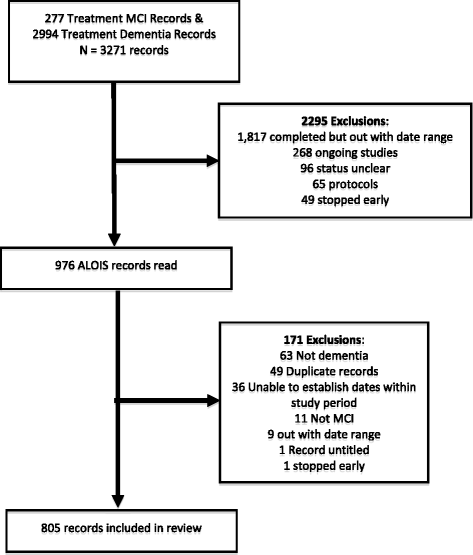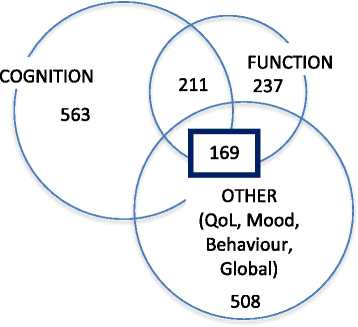Outcomes measures in a decade of dementia and mild cognitive impairment trials
- PMID: 27866472
- PMCID: PMC5116815
- DOI: 10.1186/s13195-016-0216-8
Outcomes measures in a decade of dementia and mild cognitive impairment trials
Abstract
Background: In a research study, to give a comprehensive evaluation of the impact of interventions, the outcome measures should reflect the lived experience of the condition. In dementia studies, this necessitates the use of outcome measures which capture the range of disease effects, not limited to cognitive functioning. In particular, assessing the functional impact of cognitive impairment is recommended by regulatory authorities, but there is no consensus on the optimal approach for outcome assessment in dementia research. Our aim was to describe the outcome measures used in dementia and mild cognitive impairment (MCI) intervention studies, with particular interest in those evaluating patient-centred outcomes of functional performance and quality of life.
Methods: We performed a focused review of the literature with multiple embedded checks of internal and external validity. We used the Cochrane Dementia and Cognitive Improvement Group's register of dementia studies, ALOIS. ALOIS was searched to obtain records of all registered dementia and MCI intervention studies over a 10-year period (2004-2014). We included both published and unpublished materials. Outcomes were categorised as cognitive, functional, quality of life, mood, behaviour, global/disease severity and institutionalisation.
Results: From an initial return of 3271 records, we included a total of 805 records, including 676 dementia trial records and 129 MCI trial records. Of these, 78 % (630) originated from peer-reviewed publications and 60 % (487) reported results of pharmacological interventions. Cognitive outcomes were reported in 70 % (563), in contrast with 29 % (237) reporting measures of functional performance and only 13 % (102) reporting quality of life measures. We identified significant heterogeneity in the tools used to capture these outcomes, with frequent use of non-standardised tests.
Conclusions: This focus on cognitive performance questions the extent to which intervention studies for dementia are evaluating outcome measures which are relevant to individual patients and their carers. The heterogeneity in measures, use of bespoke tools and poor descriptions of test strategy all support the need for a more standardised approach to the conduct and reporting of outcomes assessments.
Keywords: Behaviour; Cognition; Dementia; Function; Measurement; Mood; Outcome; Patient-centred; Quality of life.
Figures
References
-
- American Psychiatric Association . Diagnostic and statistical manual of mental disorders. 4. Washington, DC: American Psychiatric Press; 1994.
Publication types
MeSH terms
Grants and funding
LinkOut - more resources
Full Text Sources
Other Literature Sources
Medical



